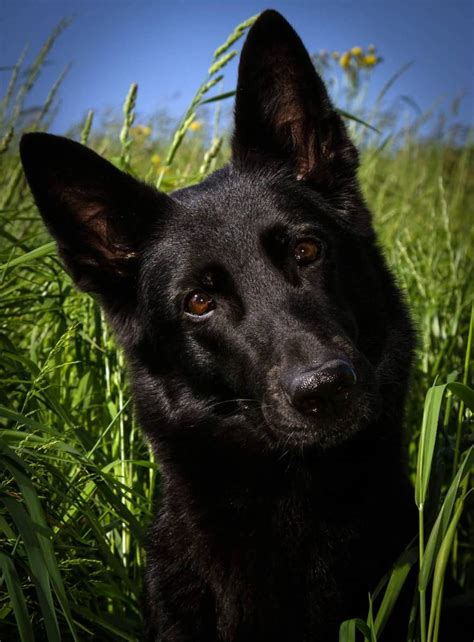The Black German Shepherd, also known as the black dog German Shepherd or German black dog, is a striking variant of the popular German Shepherd breed. These magnificent dogs are known for their solid black coat, which sets them apart from their more common tan and black counterparts. In this comprehensive guide, we'll explore the unique characteristics, rarity, and versatility of the Black German Shepherd, including their role as police dogs and family companions.
Characteristics of the Black German Shepherd
Physical Appearance
The Black German Shepherd shares many physical traits with standard German Shepherds, but their solid black coat is their most distinguishing feature. Here are some key characteristics:
- Size: Males typically stand 24-26 inches tall, while females range from 22-24 inches.
- Weight: Adult Black German Shepherds weigh between 50-90 pounds.
- Coat: Dense, double coat with a thick undercoat and longer outer coat.
- Color: Solid black from nose to tail.
- Eyes: Usually dark brown, giving an alert and intelligent expression.
- Ears: Erect and pointed, contributing to their attentive appearance.
Temperament
Black German Shepherds are known for their:
- Intelligence
- Loyalty
- Protectiveness
- Confidence
- Trainability
- Alertness
These traits make them excellent working dogs, particularly in roles such as police work and as service animals.
Is a Black German Shepherd Rare?
Yes, the Black German Shepherd is considered rare compared to other color variations of the breed. The solid black coat is the result of a recessive gene, which means both parents must carry this gene for puppies to be born with a solid black coat. This genetic factor contributes to their rarity and often higher price point in the pet market.

Black German Shepherd as a Police Dog
The Black German Shepherd's intelligence, strength, and trainability make it an excellent choice for police work. Here's why they excel in this role:
- Physical capabilities: Their size and strength allow them to apprehend suspects effectively.
- Scent detection: Excellent sense of smell for tracking and drug detection.
- Loyalty: Strong bond with their handlers, ensuring reliable performance.
- Intimidation factor: The solid black coat can be psychologically intimidating to potential wrongdoers.
Caring for Your Black German Shepherd
Exercise Needs
Black German Shepherds require significant daily exercise to maintain their physical and mental health. Here are some exercise recommendations:
- 60-90 minutes of daily activity
- Mix of walks, runs, and playtime
- Mental stimulation through training and puzzle toys
Grooming Requirements
Despite their solid black coat, these dogs still shed considerably. Regular grooming is essential:
- Brush 2-3 times per week, daily during shedding seasons
- Bathe every 4-6 weeks or as needed
- Regular nail trimming and ear cleaning
Training
Early socialization and consistent training are crucial for Black German Shepherds:
- Start training early (8-16 weeks)
- Use positive reinforcement techniques
- Focus on obedience and socialization
- Consider advanced training for working roles
Health Considerations
Like all German Shepherds, the Black variant is prone to certain health issues:
- Hip and elbow dysplasia
- Bloat (Gastric Dilatation-Volvulus)
- Degenerative Myelopathy
- Eye problems (e.g., Progressive Retinal Atrophy)
Regular veterinary check-ups and a healthy lifestyle can help mitigate these risks.
Black German Shepherd vs. Standard German Shepherd
While the Black German Shepherd is essentially the same breed as the standard German Shepherd, there are some subtle differences:
| Characteristic | Black German Shepherd | Standard German Shepherd |
|---|---|---|
| Coat Color | Solid Black | Various (Black & Tan, Sable, etc.) |
| Rarity | More Rare | More Common |
| Price | Often Higher | Generally Lower |
| Temperament | Slightly More Reserved | Varies |
| Working Ability | Excellent | Excellent |
Choosing a Black German Shepherd
If you're considering adding a Black German Shepherd to your family, keep these factors in mind:
- Reputable breeder: Ensure you're working with a responsible breeder who prioritizes health and temperament.
- Health clearances: Ask for proof of health screenings for common genetic issues.
- Socialization: Inquire about early socialization efforts for the puppies.
- Meet the parents: If possible, meet the puppy's parents to get an idea of adult temperament.
- Lifestyle match: Consider whether your lifestyle can accommodate the exercise and training needs of this active breed.
Conclusion
The Black German Shepherd is a majestic and rare variant of the beloved German Shepherd breed. Their striking appearance, combined with their intelligence and versatility, makes them excellent working dogs and loyal family companions. Whether you're considering a Black German Shepherd as a police dog, service animal, or family pet, understanding their unique characteristics and needs is crucial for providing them with the best possible care and environment to thrive.
Remember, owning a Black German Shepherd is a significant commitment. Their exercise needs, grooming requirements, and potential health issues should all be carefully considered before bringing one into your home. With proper care, training, and love, a Black German Shepherd can be an extraordinary addition to the right family or working environment.
